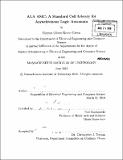| dc.contributor.advisor | Neil Gershenfeld. | en_US |
| dc.contributor.author | Green, Forrest Oliver Reece | en_US |
| dc.contributor.other | Massachusetts Institute of Technology. Dept. of Electrical Engineering and Computer Science. | en_US |
| dc.date.accessioned | 2011-02-23T14:22:15Z | |
| dc.date.available | 2011-02-23T14:22:15Z | |
| dc.date.copyright | 2010 | en_US |
| dc.date.issued | 2010 | en_US |
| dc.identifier.uri | http://hdl.handle.net/1721.1/61160 | |
| dc.description | Thesis (M. Eng.)--Massachusetts Institute of Technology, Dept. of Electrical Engineering and Computer Science, 2010. | en_US |
| dc.description | Cataloged from PDF version of thesis. | en_US |
| dc.description | Includes bibliographical references (p. 83-84). | en_US |
| dc.description.abstract | This thesis demonstrates a hardware library with related tools and designs for Asynchronous Logic Automata (ALA) gates in a generic 90nm process development kit that allows a direct one-to-one mapping from software to hardware. Included are basic design tools to enable writing ALA software, the necessary hardware designs for implementation, and simulation techniques for quickly verifying correctness and performance. This thesis also documents many of the hazards and opportunities for improving them including helpful variations to the ALA model, design tool needs, better simulation models, and hardware improvements. To embody software you could compile a hardware description language to an FPGA or synthesize it all the way to transistors. Alternatively, you could use your favorite high level language and run it on a standard processor. However, the widening gap between traditional models of computation and the reality of the underlying hardware has led to massive costs for design and fabrication as well as numerous issues for scalability and portability. Unlike any of these other approaches, ALA aligns computational and physical descriptions making it possible to use a direct one-to-one mapping to convert an ALA program to a circuit or other physical artifact that executes that program. No unpredictable fitters or compilers are needed and no extra expertise is needed for specific technologies. Similar to Mead-Conway design rules ALA designs trade flexibility for portability and ease of design. Unlike Mead- Conway design rules, ALA designs do not require any further verification-the design rule primitives are logical operations suitable for use in analysis at the algorithmic level. ALA separates many of the scaling issues that plague integrated circuit design by cleanly separating algorithm design from hardware engineering-improving design verification, tape-out costs (by reusing masks), yield, portability, and the ability to break designs across multiple chips. ALA designs are not limited to integrated circuits and could just as easily be implemented in microfluidics, magnetic logic, or a lattice of molecular logic gates. Although each of these technologies would require implementing a basic set of gates and tiling rules, hardware (or equivalently software) can be developed using the same deterministic noiseless digital abstraction using the same design in many different technologies. | en_US |
| dc.description.statementofresponsibility | by Forrest Oliver Reece Green. | en_US |
| dc.format.extent | 84 p. | en_US |
| dc.language.iso | eng | en_US |
| dc.publisher | Massachusetts Institute of Technology | en_US |
| dc.rights | M.I.T. theses are protected by
copyright. They may be viewed from this source for any purpose, but
reproduction or distribution in any format is prohibited without written
permission. See provided URL for inquiries about permission. | en_US |
| dc.rights.uri | http://dspace.mit.edu/handle/1721.1/7582 | en_US |
| dc.subject | Electrical Engineering and Computer Science. | en_US |
| dc.title | ALA ASIC : a standard cell library for Asynchronous Logic Automata | en_US |
| dc.title.alternative | Asynchronous Logic Automata application-specific integrated circuit : a standard cell library for Asynchronous Logic Automata | en_US |
| dc.type | Thesis | en_US |
| dc.description.degree | M.Eng. | en_US |
| dc.contributor.department | Massachusetts Institute of Technology. Department of Electrical Engineering and Computer Science | |
| dc.identifier.oclc | 698249960 | en_US |
